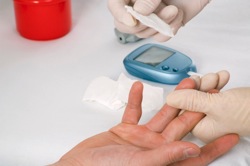
Do you have Hashimoto’s hypothyroidism and type 2 diabetes?Although insulin resistance and type 2 diabetes get pinned on diet and lifestyle choices, in some cases these disorders could be associated with an autoimmune reaction, which is the mechanism behind type 1 diabetes. As Hashimoto’s is an autoimmune thyroid disease that may lead to other autoimmune diseases, one should be aware of type 1.5 diabetes.
It is estimated 20 percent of people with type 2 diabetes also have an autoimmune reaction against the cells of their pancreas, prompting researchers to dub this "type 1.5 diabetes." Type 1.5 diabetes may be even more prevalent than type 1 diabetes.
Insulin resistance (pre-diabetes) and diabetes are typically linked with a long-standing diet heavy in sweet, starchy foods and processed fats, as well as overeating and a lack of exercise. This is often referred to as "adult-onset diabetes," although it's becoming more common in younger people as their obesity rates rise. In these cases a diet for diabetes would involve managing blood sugar. Type 1 diabetes, referred to as "juvenile diabetes," is an autoimmune disease in which the immune system attacks and destroys pancreatic beta cells, which produce insulin.
A person with type 1.5 diabetes may have aspects of both: diet and lifestyle affect pancreatic function, as does an autoimmune reaction which may or may not have been identified. People with Hashimoto’s have an increased risk of developing an autoimmune reaction against their pancreas.
Have Hashimoto’s hypothyroidism and blood sugar issues? Consider type 1.5
With type 1.5 diabetes an autoimmune reaction destroys cells of the pancreas, but the pancreas still secretes insulin—autoimmune damage is not advanced enough to shut down insulin function. In type 1 diabetes, on the other hand, more than 90 percent of the insulin-producing cells have been destroyed. Because a person with type 1.5 diabetes has not sustained pancreatic damage to such a great degree he or she is often misdiagnosed.
If you have Hashimoto’s hypothyroidism it’s important to know about type 1.5 diabetes. Autoimmune management may help prevent the condition from worsening or progressing to type 1 diabetes. It can also help manage your blood sugar and your thyroid condition.
Identifying type 1.5 diabetes if you have Hashimoto’s hypothyroidism
If you have Hashimoto’s hypothyroidism and difficulty managing your blood sugar, it's worth screening for antibodies against pancreatic beta and islet cells. Additionally, some people have antibodies against the glutamic acid decarboxylase (GAD) enzyme, which is involved in the release of insulin from the pancreas. GAD is also found in areas of the brain, and an autoimmune reaction to GAD may be associated not only with a blood sugar disorder but also with such neurological symptoms as obsessive-compulsive disorder, dizziness, or problems with balance.
Type 1.5 diabetes, gluten, and Hashimoto’s hypothyroidism
Type 1.5 diabetes requires managing the autoimmune condition. This means strictly avoiding immune-reactive foods, which for most people includes gluten and dairy. The GAD enzyme may cross-react with gluten so that eating gluten can stimulate an immune attack against GAD. This is especially pertinent to those with Hashimoto’s hypothyroidism, an autoimmune condition that also has been linked with gluten intolerance.
Additional foods that trigger autoimmune reactions can be ferreted out by adhering to an autoimmune diet for a period of time. With type 1.5 diabetes, a diet for diabetes should be an autoimmune diet that also manages blood sugar.
A number of nutritional compounds have been shown to regulate the immune system and dampen autoimmunity. Ask my office for advice on managing Hashimoto’s hypothyroidism and autoimmunity in general.



Latest from the Blog
Autoimmune Disease Management with EBOO Therapy
July 17, 2024Autoimmune diseases, characterized by the immune system attacking the body’s own tissues, present significant challenges in treatment and management. Extracorporeal Blood Oxygenation and Ozonation (EBOO) therapy offers a promising adjunctive approach to managing autoimmune conditions. Functioning similarly to a dialysis machine, EBOO filters the blood to remove toxins and pathogens that may trigger autoimmune responses. […] Read more
Latest from the Blog
Detoxification and EBOO Therapy: Optimizing Cellular Health
Detoxification plays a crucial role in maintaining optimal health in today’s toxin-laden environment. Extracorporeal Blood Oxygenation and Ozonation (EBOO) therapy offers a sophisticated approach to detoxifying the bloodstream and enhancing overall well-being. Operating similarly to a blood filtration system, EBOO effectively removes toxins, pesticides, and chemicals that accumulate in the body, supporting the body’s natural […] Read more